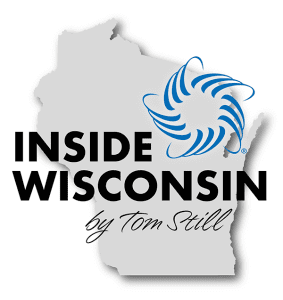By Tom Still
 MADISON, Wis. – The titles of the 150 or so posters on display in the Capitol’s Rotunda sounded just as impressive as what might be found at a symposium of doctoral students – such as “The cost of clean water: An efficiency analysis of Wisconsin’s water utilities” or “Investigating alternatives to antibiotics using phage.”
MADISON, Wis. – The titles of the 150 or so posters on display in the Capitol’s Rotunda sounded just as impressive as what might be found at a symposium of doctoral students – such as “The cost of clean water: An efficiency analysis of Wisconsin’s water utilities” or “Investigating alternatives to antibiotics using phage.”
Or, in some cases, the titles were intriguingly esoteric, such as “Gold mountains in the pinery: Chinese Americans in rural Wisconsin, 1875-1940.”
These weren’t the research products of graduate students, however, but examples of work by undergraduate students from each of Wisconsin’s 13 four-year campuses and some of its two-year centers. It was the 20th annual “Research in the Rotunda” exhibit, and it brought some of Wisconsin’s best and brightest to the center of state government.
An hour or so earlier in the same day, and just a few hundred feet away from the encircled posters, a bill-signing ceremony in the office of Gov. Tony Evers spoke to how and why Wisconsin will continue to produce research and talent to help the state, nation and world.
Evers signed into law two bills that will invest $740 million in capital projects for the Universities of Wisconsin, about half of which is for an engineering building and some dormitory work on the UW-Madison campus and the rest for a mix of projects at UW-Whitewater, UW-Eau Claire, UW-Platteville and UW-Green Bay. Also signed was a reciprocity bill to help the UW better capture tuition dollars paid by Minnesota students who attend Wisconsin campuses.
A dispute over how the UW handles “diversity, equity and inclusiveness” programs had delayed agreement on all three bills, but the outcome allowed legislators and UW officials alike to claim victory and to keep the projects on track.
The seven-story engineering building in Madison is the biggest single piece, with a total cost of $347 million that includes $197 million from the state and $150 million from private donors, much of which is still to be raised before work begins.
In addition to dramatically expanding enrollment over time at the College of Engineering, the building will allow expansion of key research programs. Both results will help talent-hungry businesses across Wisconsin and keep Madison’s engineering college competitive within its peer group.
The timing of the bill signing in Evers’ office was appropriate because it corresponded with the undergraduate research exhibit, which demonstrated the breadth of student-led projects across the state.
In many cases, the topics chosen by the students reflected the regions in which their campuses are located. Innovation in agriculture, health care, natural resources, cultural issues, communication technologies and even Wisconsin history were among major categories.
The event itself was born in the early 2000s out of a larger public process, the Wisconsin Economic Summits, which identified the need for UW campuses to become better catalysts in their local economies by competing for research dollars and helping find ways to commercialize results.
Promoted by UW System President Katharine Lyall and Regents President Jay Smith at the time, the effort led to more aggressive pursuit of federal research grants and creation of a “technology transfer” process for largely undergraduate campuses.
That process is today housed in WiSys, which works with those campuses as needed. None of this was intended to diminish graduate-level research at UW-Madison or UW-Milwaukee, but to spur more indigenous research and student growth statewide.
“Over the 20 years of hosting this event, we have featured well over 1,500 undergraduate research projects,” UW President Jay Rothman said of the March 6 poster exhibits, which paired students with faculty mentors. “Today highlights our commitment to having at least 25% of our undergraduate students involved in research at each of our universities by 2028.”
Whether it’s through a state-of-the-art engineering building in Madison or individual projects from campuses such as Superior, River Falls and Oshkosh, basic and applied research can help students with their personal growth – as well as the communities in which they live.
Still is president of the Wisconsin Technology Council. He can be reached at tstill@wisconsintechnologycouncil.com.



